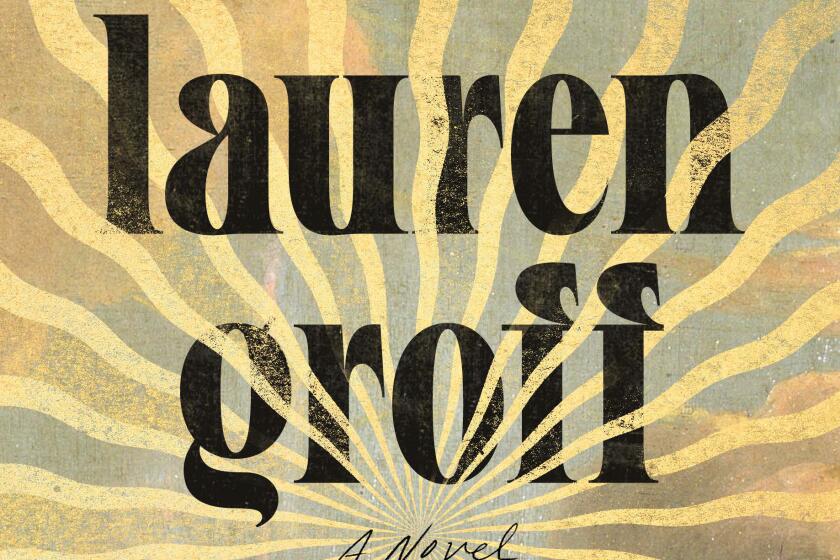Lauren Groff just reinvented the adventure novel

- Share via
Review
The Vaster Wilds
By Lauren Groff
Riverhead: 272 pages, $28
If you buy books linked on our site, The Times may earn a commission from Bookshop.org, whose fees support independent bookstores.
A young woman, scarcely more than a girl, runs into the woods. She’s escaping a settlement, closely resembling Virginia’s Jamestown, of English people who have succumbed to famine and illness.
The young woman heads north, knowing only that Frenchmen live there and she speaks enough of their language to make herself understood. As she runs, walks, stumbles, sleeps and even sails, we learn her backstory. She was bought from an orphanage at age 4 by a goldsmith and his wife, raised as a kind of pet with lessons in singing and dancing and deportment, and given charge of their second child, a daughter with multiple physical and mental challenges. Then there was the grueling trip to the new world, the colony’s collapse and, now, a solo journey that makes up the greater part of this story.
Lauren Groff’s new novel, “The Vaster Wilds,” chases the heels of her previous historical fiction, “Matrix,” about another extraordinary woman, based on the medieval poet Marie de France. This book has too little plot — or plenty of it, depending on your perspective. If you believe a novel requires narrative tugs-of-war and dynamic, multicharacter scenes, plentiful pedestrian reads await. This book is about how a person hacks a path home across treacherous landscapes. It’s almost an allegory — maybe it is an allegory — for the writer’s journey.
In ‘Matrix,’ the acclaimed novelist fleshes out the life of a mysterious medieval nun to build a glorious fantasy of female authority freed from men.
Groff’s journey has been studded with accomplishments. Her brilliance is evident across a wide range of fiction, from vivid short stories (her debut, “The Monsters of Templeton,” and her second collection, “Florida”) to twisty contemporary novels (“Arcadia,” “Fates and Furies”) and more recent reinventions of historical genres. She wields words with a surgeon’s precision and a maestro’s passion, never sacrificing craft for art or vice versa. Nor does her intellectual prowess overwhelm her empathy for victims of injustice — particularly women, but really any living creature aiming to survive.

And “Vaster Wilds” is, among other things, a survival story: a step-by-step, sometimes cave-to-cave course in basic first aid and the kinds of skills most of her readers would learn only in scouting troops. Our heroine has the tools: a hatchet, a knife and a flint.
The woman first called Lamentations Callat — both names deriving from traditions that had nothing to do with her origins — gradually reveals that she has dusky skin and one parent from a place other than London. Her adoptive mother, really her owner, says she looks Moorish. While some authors might have shoved these details up front to prompt the contemporary reader, Groff leaves them until much later, placing them only in spots where the young woman would be driven to contemplate her outsiderness.
Lamentations is not an innocent. In her 17th century speech, at times appropriately awkward, she shares that she has killed in order to escape. More telling, however, is an early moment when she finds an unfrozen stream and rummages in her carry bag for “the pewter cup she had stolen.” Survival may depend on more abstract forms of theft. You might borrow your owner’s songs and habits, even come to think of her child as your own, and steal time for yourself; none of us can avoid taking, and perhaps we’re not meant to — that’s the way Lamentations thinks at first.
“Room” novelist Emma Donoghue on the historical queer romance — and the personal schoolgirl love affair — that inspired her novel “Learned by Heart.”
And why shouldn’t she? From her earliest memories, she’s been up for grabs. During her first weeks in the woodlands, she thinks about “The men known, the men unknown. Either could be creeping near to her even now.” In her world, women have very little power: over politics and money, sure, but worse, over their own bodies and minds. One of her most vivid memories isn’t of some painful trauma: It’s her owner’s desperate use of toxic primitive cosmetics in advance of a visit from her son and his university friends.
Of course, far worse can happen to girls and women. A man sent to find her turns over the memory of killing a sex worker, “and he had since longed to do it again, he had so loved the strength in his hands and the feel of her windpipe as it collapsed. It took a tremendous amount of strength to strangle a woman to death, it was not a sport of the weak.”
Through a brief and tragic shipboard romance, Groff chooses to restore her protagonist’s faith in love. She also spares her a terrible fate at the hands of a wild man in the woods, a long-lost survivor of a Jesuit expedition gone feral. It’s the kind of near-miss that could feel, in unsurer hands, like an anticlimax.
Groff does provide — at least by Groffian standards — an action-filled escape sequence by which Lamentations employs all the tools at hand, whether stolen or crudely fashioned. We have followed her through many tribulations, including illness, hunger and exposure to the elements, and we see her make it.
A marriage is its own enclosed universe, and no one except the two people within it can know its complexities, from its wordless shorthand and built-up resentments to its ingrained loyalty and tenderness.
To say so is no plot-spoiler in a story propelled by sheer indomitable will. In fact, suspense, at least of the kind expected by an avid reader of similar adventures, is never the point.
At the risk of reading too much into a book’s front matter, it helps to know that Groff’s sister, to whom she dedicates the book, is superstar triathlete Sarah True. True’s career was derailed for a time by injuries and mental health struggles; ultimately, she switched to long-distance racing, bounced back and was recently named an Ironman “Goddess.” Lamentations’ story parallels True’s in one way: Her journey is more important than her arrival.
This is not new to Groff’s work, however. Each of her novels bears this theme, whether it centers on a woman’s view of her marriage, a boy’s perspective on communal life, a writer’s attempts to understand her chosen home or a medieval poet who becomes an abbess. Groff’s world is Darwinian, but she doesn’t chronicle the survival of the fittest; she convinces us instead that even the unluckiest among us can find a way to the blessings of peace, quiet and freedom.
Patrick is a freelance critic, podcaster and author of the memoir “Life B.”
More to Read
Sign up for our Book Club newsletter
Get the latest news, events and more from the Los Angeles Times Book Club, and help us get L.A. reading and talking.
You may occasionally receive promotional content from the Los Angeles Times.








